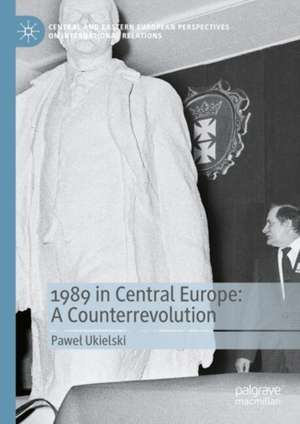1989 in Central Europe: A Counterrevolution: Central and Eastern European Perspectives on International Relations
Autor Paweł Ukielskien Limba Engleză Hardback – 15 sep 2024
Preț: 725.61 lei
Preț vechi: 884.89 lei
-18% Nou
Puncte Express: 1088
Preț estimativ în valută:
138.85€ • 148.47$ • 115.77£
138.85€ • 148.47$ • 115.77£
Carte disponibilă
Livrare economică 28 martie-11 aprilie
Preluare comenzi: 021 569.72.76
Specificații
ISBN-13: 9783031641275
ISBN-10: 3031641272
Pagini: 192
Ilustrații: Approx. 190 p. 5 illus.
Dimensiuni: 148 x 210 mm
Greutate: 0.39 kg
Ediția:2024
Editura: Springer International Publishing
Colecția Palgrave Macmillan
Seria Central and Eastern European Perspectives on International Relations
Locul publicării:Cham, Switzerland
ISBN-10: 3031641272
Pagini: 192
Ilustrații: Approx. 190 p. 5 illus.
Dimensiuni: 148 x 210 mm
Greutate: 0.39 kg
Ediția:2024
Editura: Springer International Publishing
Colecția Palgrave Macmillan
Seria Central and Eastern European Perspectives on International Relations
Locul publicării:Cham, Switzerland
Cuprins
INTRODUCTION .- PART ONE – THEORETICAL FOUNDATIONS.- Chapter I: Revolution. Theoretical foundations.- Chapter II: Counterrevolution. Theoretical foundations.- PART TWO – INTRODUCTION OF COMMUNISM.- Chapter III: Revolution in Russia and unsuccessful world revolution.- Chapter IV: Introduction of Communism in Central Europe after 1944. Export of revolution.- PART THREE – THE FALL OF COMMUNISM IN CENTRAL EUROPE IN 1989.- Chapter V: Global factors.- Chapter VI: Poland.- Chapter VII: Hungary.- Chapter VIII: GDR.- Chapter IX: Czechoslovakia.- Chapter X: Bulgaria.- Chapter XI: Romania.- CONCLUSIONS.- Chapter XII: Central Europe in 1989 – in search of general theory.
Notă biografică
Paweł Ukielski Ph. D. is a political scientist, historian and an Assistant Professor at the Institute of Political Studies, Polish Academy of Sciences.
Textul de pe ultima copertă
The literature on the fall of communism contains numerous interpretations of the changes that took place in Central and Eastern Europe in 1989, while debates about how best to characterize the fall of the communist regimes have raged for many years. Researchers continue to ponder and argue over how ‘revolutionary’, as opposed to ‘evolutionary’ (or ‘reformatory’) these changes were. In this new study, author Paweł Ukielski proposes the term ‘counterrevolution’ to describe the historical process that took place and uses it as an analytical construct to better understand the crisis of Soviet communism and the subsequent transitions that took place.
Paweł Ukielski Ph. D. is a political scientist, historian and an Assistant Professor at the Institute of Political Studies, Polish Academy of Sciences.
Paweł Ukielski Ph. D. is a political scientist, historian and an Assistant Professor at the Institute of Political Studies, Polish Academy of Sciences.
Caracteristici
Proposes a new approach to understanding the fall of communism in 1989 Focuses on Central Europe and aims to start debate on the phenomenon of counterrevolution Explores the transition following the fall of Communism











